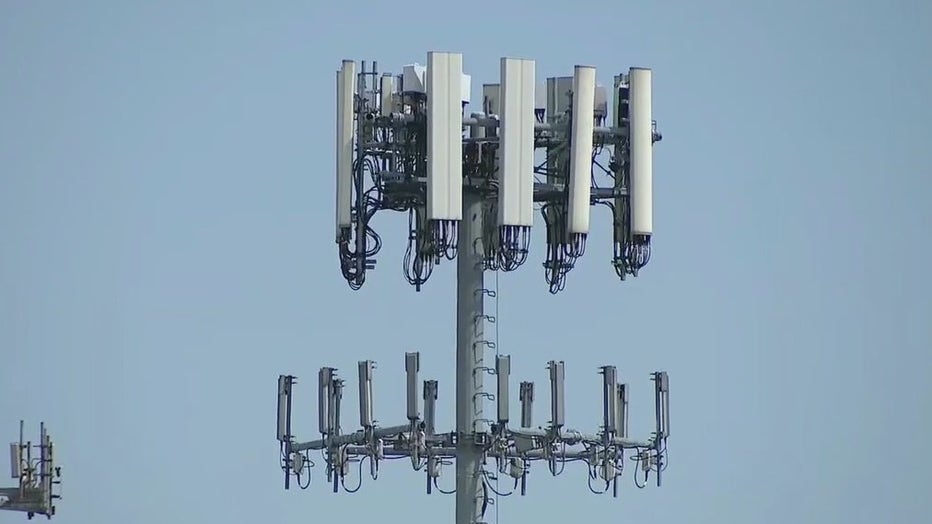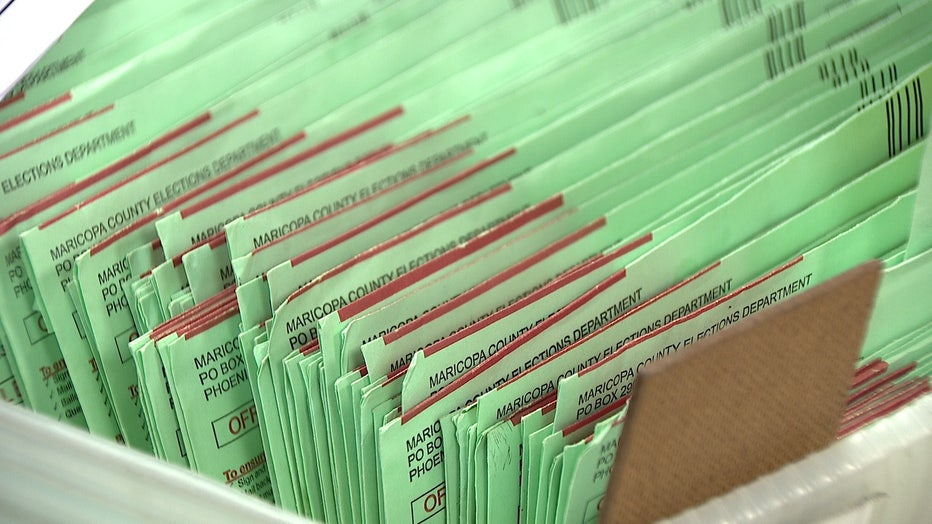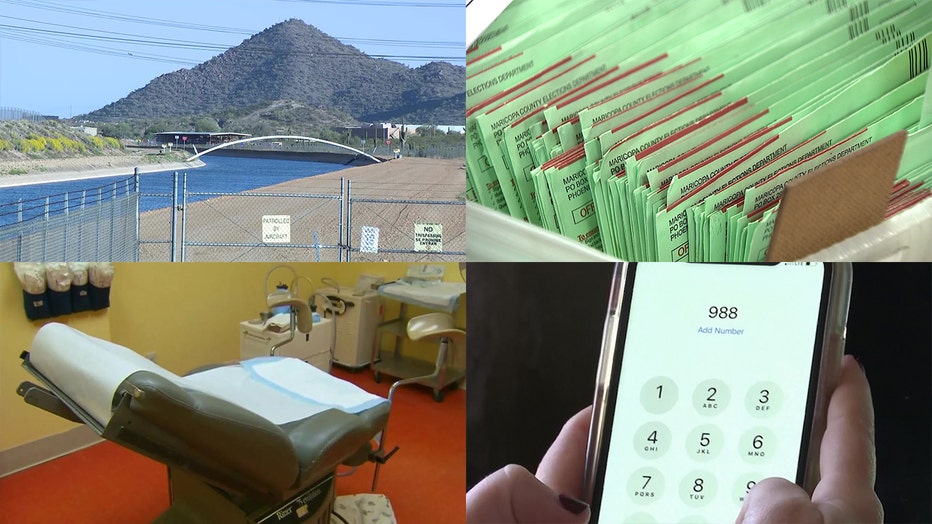2022 In Review: Taking a look at the some of our major explainer stories this year
PHOENIX - 2022 has been a year with that left people with a lot of questions, and throughout the year, viewers came to our website for answers by reading explainer articles that we have been publishing on certain top issues we faced.
Here's a list of some of the top Explainer stories for 2022.
January - Desalination
As the state continues to feel the effects of a megadrought, leaders began to look for ways to address potential water supply cutbacks and shortages.
During what would be his final State of the State Address, Governor Doug Ducey proposed setting aside $1 billion to bring desalinated water, or saltwater that has been converted into freshwater by removing salt that has dissolved into the water, to Arizona.
"Our goal: secure Arizona’s water future for the next 100 years," said Gov. Ducey.
While Gov. Ducey offered few details on desalination during his address, our explainer on desalination explored what it involves, as well as its pros and cons.
February - 3G Shutoff

2022 marks the final year the country's major cell service providers operated a 3G network, as they switch off the network in favor of newer and faster telecommunication technologies.
Of the major cell service providers, AT&T shut off their 3G network on Feb. 22, while T-Mobile shut off theirs completely by July 1. Verizon's 3G network will be shut off by Dec. 31, following a multi-year delay.
The 3G network shutoff required some Americans with older model phones to either update their phone's software, or get a new device. FCC officials say some medical devices, tablets, smartwatches, and even home security services could be affected by the 3G network switchoff.
March - Vodka and the Russian Invasion of Ukraine

(Photo by Soeren Stache/picture alliance via Getty Images)
With the invasion of Ukraine by Russia in late February, stores and bars in parts of the country, including some in the Phoenix area, have either stopped selling vodka or dumped out vodka in protest of the war.
Some, however, say such boycotts have a limited impact on Russia.
While vodka is deeply embedded in Russian culture, many of the vodka brands available in the U.S. are made outside of Russia, and the U.S. only imported about $18.5m worth of vodka from Russia in 2021. In all, the U.S. imported $1.41 billion worth of vodka in 2021.
April - Women on Death Row

(From left to right) Wendi Andriano, Shawna Forde, and Sammantha Uriarte, also known as Sammantha Allen
Amid news that Arizona officials are seeking to execute Clarence Dixon following what amounted to an 8-year moratorium on executions in Arizona, there was a focus of sorts on not only Dixon, but capital punishment in Arizona.
As of Dec. 28, there are 110 people on Arizona's death row. Arizona's death row consists of an overwhelming majority of men, but there are three female death row inmates: Wendi Andriano, Shawna Forde, and Sammantha Uriarte (also known as Sammantha Allen).
Our explainer on female death row inmates takes a look at the three female death row inmates, as well as what they did that led them to be sentenced to death.
Read More: Only 3 women are on Arizona's death row: Who are they and what were they sentenced to death for?
May - Botched Executions

As Dixon's date of execution drew near (he was executed on May 11), the spotlight remained on capital punishment in Arizona.
Arizona, according to the Death Penalty Information Center, has had capital punishment since at least 1865, and the state has had two executions that some say was botched.
A botched execution is defined by the Death Penalty Information Center as "a breakdown in, or departure from, the ‘protocol’ for a particular method of execution," citing a book written by a professor with Amherst College.
June - Roe v. Wade and Abortion in Arizona
In the aftermath of a ruling by the U.S. Supreme Court that overturned the Roe v. Wade ruling that protected abortion rights across the country, whether or not abortion is legal or illegal in Arizona became unclear due to a pair of conflicting state laws.
While Gov. Doug Ducey signed a 15-week abortion ban into law in March, an old law that dates back to at least 1901 - 11 years before Arizona became a state - became the topic of discussion.
That old law, known legally as ARS 13-3603, bans all abortions, with an exception to safe a woman's life. On June 29, Attorney General Mark Brnovich announced, in a tweet, that ARS 13-3603 would become law, and would not be repealed by the 15-week abortion ban that Gov. Ducey signed.
The state's dueling abortion laws would go on to become the topic of a legal battle.
Read More: Arizona's near-total abortion ban: Here's what to know about ARS 13-3603
July - 988
On July 16, authorities launched 988, a new three-digit number that people can call across the U.S. to get mental health from trained personnel.
988 was designated as the dialing code for the National Suicide Prevention Lifeline via a federal legislation that was signed into law in 2020, but the idea for a three-digit mental help hotline number dates back to at least 2018.
Our 988 explainer takes a look at the history of 988, why the number 988 was chosen instead of other three-digit numbers, and what happens when someone calls 988.
Read More: What is 988, the new mental health crisis hotline number that has launched nationwide?
August - AI Rapper

(Photo by Jakub Porzycki/NurPhoto via Getty Images)
August brought a rather unusual story in terms of our explainers: the rise and fall of a virtual rapper named FN Meka.
FNMeka is not a real person. It is a virtual artist whose content on TikTok was created by augmented reality. FN Meka's music, meanwhile, was created by artificial intelligence. The rapper was signed by Capitol Records, albeit for a short time.
A day after we first published the explainer article on FN Meka, references to FN Meka were scrubbed from Capitol Records' website. We reached out to Capitol Records for comment, and a spokesperson with the record company announced that they have severed ties with the FN Meka project.
Our explainer article takes a look at not only FN Meka, but the world of virtual artists, and what it could mean for the music industry in the future.
Read More: Record label severs ties with FN Meka: What you should know about the AI-powered virtual rapper
September - Death of Queen Elizabeth II
The death of British monarch Queen Elizabeth II after decades on the throne marks the end of an era for not only the United Kingdom, but for many other countries around the world.
With the death of the queen and the subsequent, automatic ascension of Charles as the first British male monarch in 70 years, many changes are expected for not only the UK, but also for countries that are geographically closer to the U.S., including Canada.
Read More: Death of Queen Elizabeth II: What could change in the months ahead as Charles becomes king
October - State Mine Inspector
As the November election drew closer, more people began to look for information related to the vote, as well as some of the offices that are up for election.
Arizona is unique in the U.S. for being the only state with an elected state mine inspector position. A person who wrote a book on the Arizona State Constitution states that having an elected mine inspector shows that when Arizona became a state, mining was a prominent industry in the state.
Our explainer article on the State Mine Inspector takes a look at the duties a State Mine Inspector has, as well as the requirements for office.
Read More: 2022 Election: What you should know about the vote for Arizona Mine Inspector
November - Ballot Curing

Arizona voters went to the polls on Nov. 8 to select a new governor (Gov. Ducey was barred from seeking another term due to term limits), as well as voting on various statewide races.
For some voters, however, they needed to fix signature issues on their ballot before their ballot will be counted, in a process known as "ballot curing."
For ballots with inconsistent signature, the ballot curing deadline was the 5th business day after Nov. 8, since the election involved a federal race.
Our explainer article talks about the process of ballot curing, as well as some of the rules surrounding it.
Read More: Ballot Curing in Arizona: What is it, and why you need to act now if you're affected
December - Dog Flu
With the arrival of winter, many people began to suffer from the flu. However, humanity's four-legged friends were also hit hard with what is known as "dog flu."
According to the Centers for Disease Control and Prevention, Dog Flu is a contagious respiratory disease in dogs that is caused by a specific type of flu virus that is known to infect dogs.
The disease is spread mainly among dogs through respiratory droplets produced during coughing and sneezing from infected dogs, or through contact with contaminated surfaces.
Dog Flu, however, is very unlikely to infect humans.
Read More: What is dog flu, and what pet owners should be on the lookout for this winter


